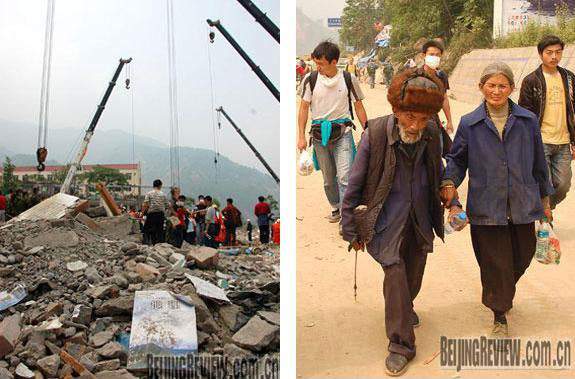| 
Rescue efforts at the Beichuan Middle School A couple leaves the township of Beichuan
Before beginning my trip, some 30 hours after the earthquake on May 12, I already had some information about the situation in the quake disaster zone: electricity, water, gas were all out of service, communications were down, food was insufficient, some mountainous roads were damaged, there was a risk of disease spreading, and frequent aftershocks continued to hit the area.
I was prepared for all of those and traveled with little luggage as I imagined I would be sleeping in tents by the roadside or public parks.
The real accommodation was much better than expected with many hotels in the province's capital city Chengdu still in service. Chengdu was not seriously affected by the quake.
After the first few days I became used to the frequent aftershocks and no longer worried about them, but as we drew closer to the epicenter of the earthquake slithers of fear began to creep into my heart. I learned to sleep with my clothes on and my bag packed, ready to run for safety in the event of a large aftershock.
Setting off from Chengdu, we spent two hours on the journey to Beichuan, one of the worst hit places, on May 16. Our hired car got us through several roadblocks and within eight km of our destination, where we were finally stopped.
From there we traveled on the back of motorcycles ridden by local men who to carried us along the last leg of our journey into Beichuan.
The tragedy I witnessed in Beichuan is something I will recall for the rest of my life. Hearing about the death and destruction reaped by the earthquake was heart wrenching, but seeing it firsthand was a tortuous experience.
At the collapsed middle school of Beichuan there was a cluster of corpses balled together so tightly that rescuers were unable to pull them apart. The sight and thoughts of what those students had been through before death broke my heart that day and haunted me that night, leaving me unable to sleep.
But that horrible experience was diluted by the touching mercy and love showed by the people around me doing all they could to rescue the trapped and help the injured and homeless. I saw real evidence of the human spirit triumphing over disaster and it brought to mind the words of one of my favorite authors, Ernest Hemingway, who said, "A man can be destroyed but not defeated."
Those words gave me solace as we hitchhiked our way out of Beichuan, traveling first on a tractor packed with quake-hit victims and then on an SUV driven by volunteers who had been delivering supplies. Lives have been destroyed by the earthquake, but the human spirit remains strong. | 